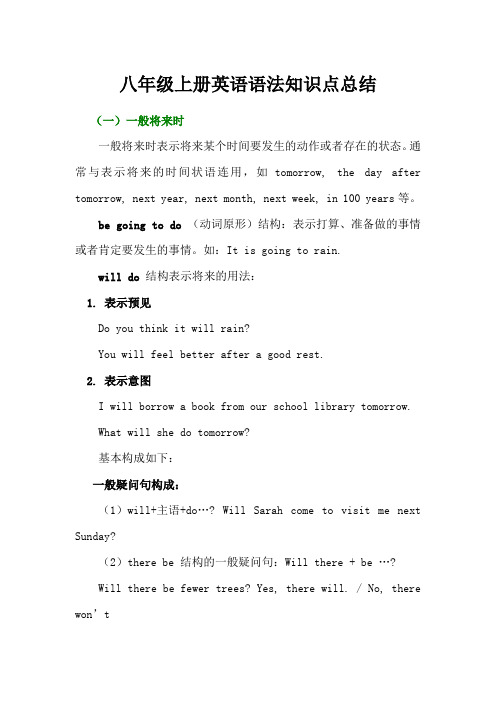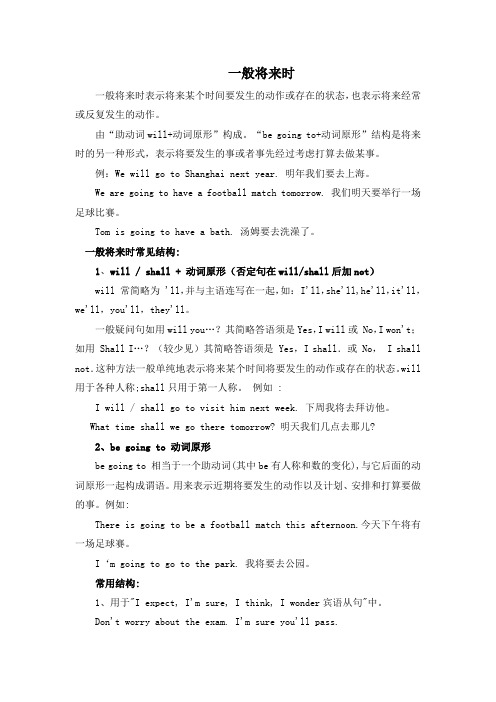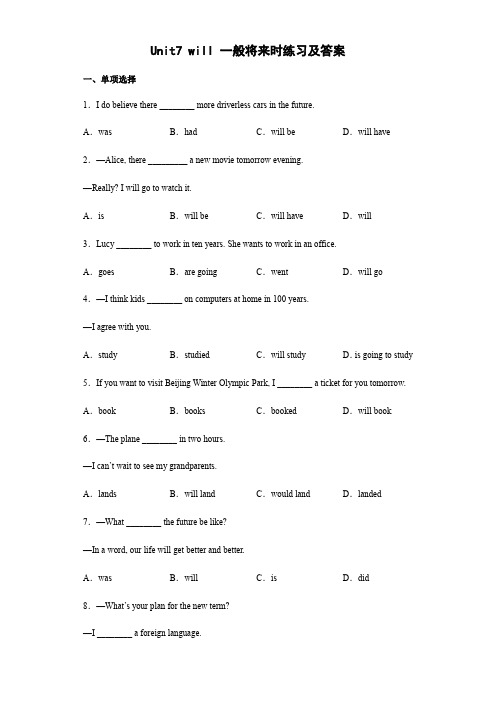初中英语人教版八年级上册一般将来时
初中同步人教版八年级上册Unit10专项综合全练(三)一般将来时、动词不定式、祈使句、情态动词can

初中同步人教版八年级上册Unit 10 If you go to the party, you1 I I have a great time!专项综合全练(三)一般将来时、动词不定式、祈使句、情态动词canmightshouldv条件状语从句学校:姓名:班级:考号:一、单项选择1.put any relish(调味品)on the turkey sandwich.A. NoB. NotC. Don'tD. Doesn't2.We our holidays in Hong Kong next year.A. visitedB. spentC ・ are going to visitD. are going to spend3.—Why are you so excited?——Because Peter invited me on a trip to Huangshan.A. to goB. goC. goingD. will go4.Wang Lin is trying English because she plans to England.A. learn, to goB. to learn, goingC. learning, to goD. to learn, to go5.. the project as planned, they need to work two more hours a day.A. To finishB. FinishingC. FinishD. To be finished6.My classmate is jumping so far! I believe my eyes.A. shouldn*tB. needn'tC. mustnftD. can't7.Please the rubbish into different litter bins according to the signs.A. putsB. putC. to put8.Nobody can hear you you speak in a louder voice.A. unlessB. ifC. whenD. after9.Gina has the flu and she go to the doctor.A. shouldB. canC. mayD. mustn't10.—I to Hainan on vacation with my parents this coming summer holiday.一That's great!A. goB. wentC. will goD. have gone11. A CCTV news reporter will come to interview Wang Lin tomorrow. Please tell her 这事。
初中教育英语人教版八年级上 微课-be going to

2、Hurry up! The sky is covered with black clouds. I’m afraid it B
A. rains
B. is going to rain
C. rained
D. was raining
直击中考
1、There A a basketball match between Class One and Class Three this afternoon.
A. is going to be B. will have
C. are going to be D. is going to have
1. 我打算下个月去北京参观。
I’m going to visit Beijing next year.
2. 玛丽要卖她的汽车。 Mary is going to sell her car.
否定句:
主语+be+not+ going to + 动词原形+其他.
4. 玛丽不打算卖她的汽车了。 Mary is not going to sell her car.
会发生的动作。
Eg: 1、I’m going to be a ping-pong player. 2、Look at those dark clouds!It’s going to rain
soon.
Be going to
句式:肯定句、否定句、疑问句
肯定句:
主语+be going to + 动词原形+其他
7. 你打算什么时候去学校? When are you going to go to school?
8. 你打算怎样去学校? How are you going to go to school?
八年级上册英语语法知识点总结

八年级上册英语语法知识点总结(一)一般将来时一般将来时表示将来某个时间要发生的动作或者存在的状态。
通常与表示将来的时间状语连用,如tomorrow, the day after tomorrow, next year, next month, next week, in 100 years等。
be going to do(动词原形)结构:表示打算、准备做的事情或者肯定要发生的事情。
如:It is going to rain.will do结构表示将来的用法:1. 表示预见Do you think it will rain?You will feel better after a good rest.2. 表示意图I will borrow a book from our school library tomorrow. What will she do tomorrow?基本构成如下:一般疑问句构成:(1)will+主语+do…? Will Sarah come to visit me next Sunday?(2)there be 结构的一般疑问句:Will there + be …?Will there be fewer trees? Yes, there will. / No, there won’t否定句构成:will + not (won’t)+doSarah won’t come to visit me next Sunday.特殊疑问句构成:特殊疑问词+will+主语+…?What will Sarah do next Sunday?练一练根据例句,用will改写下列各句例:I don’t feel well today. (be better tomorrow)I’ll be better tomorrow.1. Gina has six classes today. (have a lot of homework tonight)_____________________________2. I’m tired now. (sleep later)_____________________________3. My parents need a new car. (buy one soon)_____________________________4. We can’t leave right now. (leave a little later)_____________________________5. The weather is awful today. (be better tomorrow)_____________________________答案:1. She’ll have a lot of homework tonight.2. I’ll sleep later.3. They’ll buy one soon.4. We’ll leave a little later.5. Maybe it’ll be better tomorrow.(二)should的用法:should用来提出建议和忠告,后边加动词原形,否定句直接在should后边加not.例如:I think you should eat less junk food.我认为你应该少吃垃圾食品。
初中英语一般将来时

一般将来时一般将来时表示将来某个时间要发生的动作或存在的状态,也表示将来经常或反复发生的动作。
由“助动词will+动词原形”构成。
“be going to+动词原形”结构是将来时的另一种形式,表示将要发生的事或者事先经过考虑打算去做某事。
例:We will go to Shanghai next year. 明年我们要去上海。
We are going to have a football match tomorrow. 我们明天要举行一场足球比赛。
Tom is going to have a bath. 汤姆要去洗澡了。
一般将来时常见结构:1、will / shall + 动词原形(否定句在will/shall后加not)will 常简略为 'll,并与主语连写在一起,如: I'll,she'll,he'll,it'll,we'll,you'll,they'll。
一般疑问句如用will you…?其简略答语须是Yes,I will或 No,I won't;如用 Shall I…?(较少见)其简略答语须是 Yes,I shall.或 No, I shall not.这种方法一般单纯地表示将来某个时间将要发生的动作或存在的状态。
will 用于各种人称;shall只用于第一人称。
例如 :I will / shall go to visit him next week. 下周我将去拜访他。
What time shall we go there tomorrow? 明天我们几点去那儿?2、be going to 动词原形be going to 相当于一个助动词(其中be有人称和数的变化),与它后面的动词原形一起构成谓语。
用来表示近期将要发生的动作以及计划、安排和打算要做的事。
例如:There is going to be a football match this afternoon.今天下午将有一场足球赛。
Unit7 will 一般将来时练习人教版八年级英语上册

Unit7 will 一般将来时练习及答案一、单项选择1.I do believe there ________ more driverless cars in the future.A.was B.had C.will be D.will have 2.—Alice, there _________ a new movie tomorrow evening.—Really? I will go to watch it.A.is B.will be C.will have D.will3.Lucy ________ to work in ten years. She wants to work in an office.A.goes B.are going C.went D.will go4.—I think kids ________ on computers at home in 100 years.—I agree with you.A.study B.studied C.will study D.is going to study 5.If you want to visit Beijing Winter Olympic Park, I ________ a ticket for you tomorrow. A.book B.books C.booked D.will book 6.—The plane ________ in two hours.—I can’t wait to see my grandparents.A.lands B.will land C.would land D.landed 7.—What ________ the future be like?—In a word, our life will get better and better.A.was B.will C.is D.did 8.—What’s your plan for the new term?—I ________ a foreign language.A.learn B.am learning C.learned D.am going to learn9.Uncle John ________ London next week.A.will leave to B.will leave for C.leaves to D.leaves for 二、改写句子10.What’s the weather like in Beijing?(用tomorrow 改写句子)What ________ the weather ________ ________ in Beijing tomorrow?11.He often goes swimming on Sunday morning. (用tomorrow morning改写)He _________ _________ swimming tomorrow morning.12.We will have enough time to study and exercise. (改为否定句)We ________ ________ enough time to study ________ exercise.13.I will go with you today. (改为一般疑问句)________ ________ go with ________ today?14.Will there be a great sports meeting in Beijing. (作肯定回答)Yes, ________ ________.15.My cousin will visit the zoo this Sunday.(对划线部分提问)_________ _________ your cousin _________ this Sunday?16.They will go shopping at three o’clock. (对划线部分提问)________________五、用所给单词的正确形式填空17.We won’t ________ (lose) the game.18.There _________ (be) an interesting movie at the theater next weekend. 19.—Shall we ________ (go) to the movies?—Good ideas.20.—________ you ________ (be) here next Saturday?—No, I ________ (visit) my teacher.21.Mary’s birthday is next Monday, her mother ________ (give) her a present.22.It is very cold these days. It ________ (snow) soon.23.I ________ (be) tired. I ________ (go) to bed early tonight.24.—What ________ they ________ (do) next Sunday ?—They will do sports.25.Mr Smith ________ (leave) for America next week.26.We have no more vegetables in the fridge. I ________ (go) and buy some.六、短文填空根据短文内容及括号内所给单词的提示,结合单元语法补全短文。
初中英语语法一般将来时

一般将来时一.一般将来时的定义:表示将来某一个时间将要发生的动作或存在的状态,表示将来经常或重复发生的动作。
二.一般将来时的标志:tomorrow(明天),the day after tomorrow(后天)next year(明年)next month(T—个月)next week(下一个星期)3.一般将来时的构成:1.主语^be(am,is,are)going to+动词原形+..例如:(1).I am going to play football tomorrow.明天我将要踢足球.(2).She is going to watch a movie the day after tomorrow.后天她要看一场电影.2.主语+will/shall+动词原形+.....说明:(l).will/shall有时可以和be going to互换;(2) .will是万能的,shall只能用在第一人称,主语是I,we.(3) .will和shall的后而接动词原形)例如shall/will go to Beijing next month.。
will=I11)下个月我将要去北京.(2) .You will come to see me tomorrow.(you will=you'll)明天你将要来看我.(3) .She will read English tomorrow moming.(She will=She'll)明天早上她将要读英语.四.句一般将来时的式:1.肯定句:(1) ..主语+be(am,is,are)going to+动词原形+......(2) ..主语+will/shall+动词原形+.....例句和上面一样,就不举了.2.否定句:(1)..主语+be(am,is,are)not going to+动词原形+......例如:(A):I am not going to play basketball tomorrow.明天我不将踢足球.(B).She is not/isn't going to visit Shanghai next year.明年她不将参观上海.(2)..主语+will/shall not+动词原形+.....(A).I shall not go to school the day after tomorrow o后天我不将上学了(B).I will not write my homework this evening.(will notl=I won't)今晚我不将写作业(C).She will not see a movie next week.(will not=won't)下个星期她将不看一场电影.3.一般疑问句:(A).Am/Is,Are+主语+going to+动词原形+....例如(A).—Am I going to see my grandfather tomorrow?明天我将去看我的爷爷吗?—Yes,you are.是的,你将去.(B).— Are you going to listening to the tape tomorrow?明天你将听录音带吗?—No,I am not.不,我不将.(C). —Is she going to Beijing next year? 明年我将去北京吗?-Yes,she is.是的,她将.(2).Will//shall+主语+动词原形+…例如(A). —Shall we play volleyball next class?下一节课我们将打排球吗?-Yes,you will,是的,你们将.(B). —Will you come here next week?下个星期你将来这儿吗?-Yes,I will.是的,我将.(C).--Will she teach us this term?这学期,她将教我们吗?—Yes,she will.是的,她将.4.特殊疑问句:(1).What(Where,How...)+be(am,is,are)+主语+going to+动词原形+...?例如:(A).—What are you going to do tomorrow? 明天你将要做什么?—rm going to the park? 我将要去动物园.(B).--Where are you going to swim? 你将要去哪儿游泳?—I'm going to swim in the river.(2). What(When,Where,How...)+主语+动词原形+...?例如:(A).---What will you do next week?下个星期你将要做什么?--1 will do my homeworko 我将要做作业.(B).—How will she come here tomorrow?明天她将要怎么来这儿?—She will come here by bus 。
八年级上册英语语法总结

初中英语八年级上册知识点总结一、一般现在时、一般过去时、一般将来时和现在进行时1.一般现在时〔1〕定义:一般现在时表示经常或习惯性的动作或一般性事实。
〔2〕用法:①表示事物或人物的特征、状态。
如:The sky is blue.天空是蓝色的。
②表经常反复性发生的动作。
如:I get up at six every day.我每天六点起床。
③表示客观现实。
如:The earth goes around the sun.地球绕着太阳转。
④表示平日的喜好。
I like bananas. We don’t like vegetables.〔3〕构成:①be动词:主语+be(am,is,are)+其它。
如:I am a boy.我是一个男孩。
②行为动词:主语+行为动词(+其它)。
如:We study English.我们学习英语。
当主语为第三人称单数(he, she,it 等)时,动词词尾有所变化。
第三人称单数动词词尾的变化有几种形式:①一般情况加-s reads, says, takes②sh、ch、s、x、o 结尾的加-es teaches, washes, goes, misses, mixes③以辅音字母加y 结尾的词变y 为i 再加-es studies, cries, carries 如:Mary likes Chinese.玛丽喜欢汉语。
Miss Gu teaches us English. 顾老师教我们英语。
〔4〕句式变化:①be 动词的变化。
否认句:主句+be+not+其它。
如:He is not a worker.他不是工人。
一般疑问:Be+主语+其它。
如:-Are you a student? -Yes,I am. / No,I’m not.特殊疑问句:特殊疑问词+一般疑问句。
如:Where is my bike?②行为动词的变化。
否认句:主语+don’t(doesn’t)+动词原形(+其它)。
初中英语一般将来时讲解与练习(含答案)

一般将来时讲解与练习一、概念:一般将来时表示将来某个时间要发生的动作或存在的状态,及计划、打算或准备做某事。
常常与表示将来的时间状语连用。
如:tomorrow,next day(week, month, year…),soon,the day after tomorrow(后天)等。
二、常用的表达形式共有五种,现归纳如下:(一)“will +动词原形”这一形式,主要用于在以下几个方面:1、表示单纯的未来“将要”通用于各个人称。
eg:They will go to visit the factory tomorrow. 明天他们将去工厂参观。
I’ll come with Wang Bing and Yang Ling. 我将和王兵、杨玲一起来。
The rain will stop soon. 雨很快就要停了。
2、表示不以人的意志为转移的自然发展的未来的事。
eg:Today is Saturday. Tomorrow will be Sunday. 今天是星期六。
明天是(将)是星期日。
He will be thirty years old this time next year. 明年这个时候他就(将)三十岁。
3、问对方是否愿意做某事或表示客气地邀请或命令。
eg: Will you please turn on the radio? 请打开收音机好吗?Will you go to the zoo with me? 你和我一起去动物园好吗?Shall we go there at five? 我们五点钟去那儿,好吗?Will you please open the door? 请你把门打开,好吗?注:在口语中will用于所有人称,书面语中第一人称常用shall。
(二)“be going to+动词原形”的形式,表示事先经过考虑、安排好打算、计划要做的事情以及已有迹象表明必将发生某事,意为“打算;就要”。
- 1、下载文档前请自行甄别文档内容的完整性,平台不提供额外的编辑、内容补充、找答案等附加服务。
- 2、"仅部分预览"的文档,不可在线预览部分如存在完整性等问题,可反馈申请退款(可完整预览的文档不适用该条件!)。
- 3、如文档侵犯您的权益,请联系客服反馈,我们会尽快为您处理(人工客服工作时间:9:00-18:30)。
---by Lemon
Teaching aims: 1.要求学生掌握一般将来时的用法、结构及句式变化。
Teaching points: 1. 一般将来时结构在实际题目中的运用。
2.使学生能够理解Will, be going to, there will be.
Teaching aids: 心理测试纸、练习题
Teaching steps:
1. Greeting: T: what’s the weather like today?
Ss: it’s….
T: what’s the weather like tomorrow? \Will it be sunny?(看黑板上的图片)T引导Ss说出: It will be sunny tomorrow.
2. Roll-call
3. Warm –up 做一份心理测试
在做之前,T可以先问大家一个问题,渲染气氛。
T:What do you think you will be?
T引导Ss说出:I will be a ….
每人一张测试纸,2分钟做好,T公布答案,让学生找出相应的职业, 并表达I will be a ….
4. Structure
①由warm-up引出一般将来时。
T问Ss:What will you be?
T引导Ss说出答案I will be a teacher. She will be a teacher. …
I will be a engineer. He will be a engineer. …
I will be a doctor. They will be a doctor. …
T边说边写出板书
看以上句子,总结如下:
点明用法:一般将来时表示将要发生的动作或存在的状态及打算、计划或准备做某事。
通常会出现此类时间状语:tomorrow, next day(week, month, year), soon, the day after tomorrow. 标志词:will, be going to
②归纳一般将来时的结构
Now, look at some sentences, and then tell me the similarities.
ep.看warm-up 的板书,再增加几个句子。
It will be fine.
I’ll be at home.
He’ll go there.
让Ss发言,说出共同点
T和Ss一起总结结构:主语+be going to+动词原形
主语+will+动词原形
# be going to=will
# will的缩写形式: I’ll=I will, He’ll=He will, won’t=will not。
